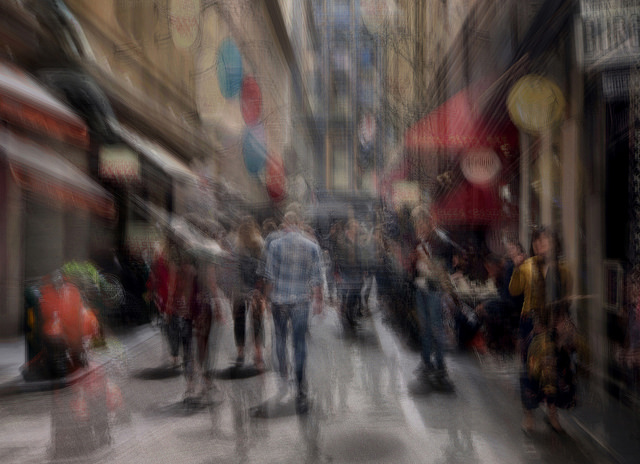In 2016, I spent one and a half year doing fieldwork in a neighbourhood of the Turkish city Kırşehir. There, I investigated everyday interaction between refugees and local residents. One of the topics that emerged from the field was what I call a desire for ordinariness. In this blogpost, I will discuss the meaning and implications of the desire for ordinariness among the refugee population in Kırşehir.
As opposed to the activist agenda which often aims to increase social visibility and audibility of disadvantaged groups, the refugees I worked with did not have a desire for gaining visibility or attention. Rather, what they looked for was simply to live ordinary lives as ordinary people. I define their desire to go unnoticed and not to be marked as different from the mainstream society as a desire for ordinariness. For example, in public spaces such as parks and open markets, they did not want to be noticed or to stand out. They wanted to carry on their lives as they used to by being an organic part of the crowd rather than being marked as an outsider or being spoken about. It did not matter whether they were seen as different in a good or bad way, they just wanted to be ordinary.

In an interview I had with an Iraqi Turkmen refugee in his late 20s, he reported that he preferred to hide his Iraqi origin because whenever he revealed his refugee identity, he had to answer numerous questions regarding the war and his economic and familial situation in Turkey. His exact words were as follows:
Malik: I entered the tea house to drink coffee: “hi” – “hi”. I go to such places. “You, where are you from?” they asked.
Me: Did they notice it on your appearance?
Malik: They didn’t, but I said, “hi!” – “hi welcome” -“thank you”. Then they ask. One guy asked, “Where are you are from?” I said, “I am from Kırşehir.” [the name of the city in which this conversation takes place].
Me: [laughs] So then…
Malik: “From which part of Kırşehir?” – “From the center” He said, “It is okay, not important, welcome”. Then I talked. I said it to him, “Brother I’m not from here.” – “Where are you from?” – “I am Iraqi Turkmen”. Now that they learn I am Iraqi Turkmen they ask, “How was Iraq in the past? “How is it going be? “How is Iraq doing now?” Something like that he asks. If I say there is a war he asks about the war, “How many brothers and sisters of you did you leave there?” “How do you survive here?” “How did you come here?” “Are your mum your father here?” And so on, they ask so many things.
Drawing on this example, it is clear that all Malik wants is to enjoy talking about ordinary and everyday issues in the tea house just like other regular customers. However, when he reveals his refugee identity, he loses the chance of simply small talking with other clients. His existence in the tea house as a refugee stands out. Therefore, as Malik told me during our conversation, he had hidden the “refugee” features in his appearance, such as the accent and type of behaviour since he came here. I do not interpret his convergence towards the local population as a kind of avoidance from a possible racist threat or as a survival strategy. Instead, during the fieldwork, I got the impression that this situation stemmed from a desire to be ordinary. His expectation was simply to go with the flow. Similarly, a 25-year-old Syrian refugee I met told me he exaggerated his verbal and non-verbal reactions in his conversations with the men in the tea houses in order to keep up with the ambiance, and thus blend in. For example, he said he laughed at jokes the local customers made even if he did not understand. He also insulted Arabs along with the locals, despite his Arab origin.
Similar verbal and nonverbal actions which aim to achieve ordinariness reiterated themselves across the refugees I worked with. Abandoning heritage clothes and putting on pants and t-shirt were quite popular specifically among the young female refugees. Their goal was apparently to erase salient features implying their refugee identity. However, they were often blamed for selling out their own group values, and emulating other groups both by the local and more traditional refugee women. Hence, their desire to be just like other women ended up with hypervisibility and marginalisation.
This short illustration of the desire for ordinariness among refugees in Kırşehir carries some relevance for activism and academia. One potential avenue would be to develop community and academic projects which aim neither to make refugees feel special nor to put them in a disadvantageous position. This approach would not underestimate the refugees by conceptualising them as as weak group in need of our generosity and special care. It would neither overestimate them as United Nations High Commissioner for Refugees (UNHCR) did on the World Refugee Day by disseminating positive information such as, e.g. ‘Albert Einstein was a refugee’. Refugees do not have to prove their legitimacy to anyone by achieving high standards. Let them be ordinary.

HASRET SAYGI is a PhD candidate in the Department of Foreign Languages at Bogazici University. Her expertise lies in the areas of sociolinguistics and linguistic ethnography with a specific focus on the issues of identity, migration and intercultural communication.
